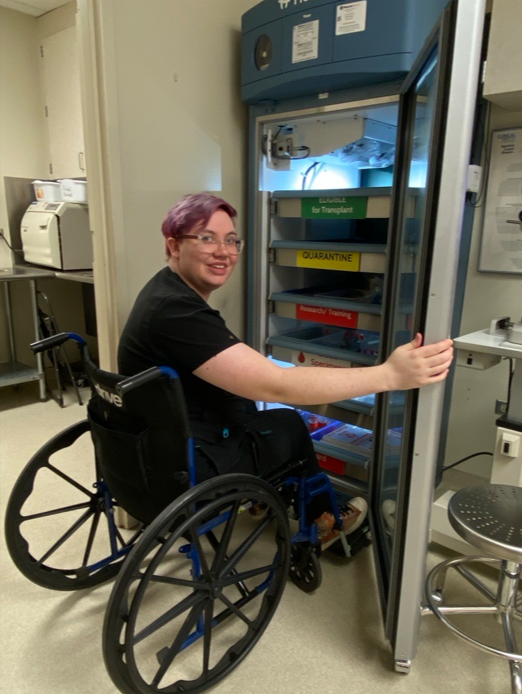Eyes on Hope: A Conversation with Alex O’Connell, Eligibility Specialist
Read about Alex O'Connell’s role in helping to ensure eye tissue is qualified and deemed eligible for transplant.
By Leah Whiticker - July 28, 2025
When we think of eye donation and cornea transplants, we often picture the moment someone regains their vision. But what happens long before that life-changing moment is just as vital- and just as inspiring. At the heart of that behind-the-scenes process is the eligibility specialist, one of the most essential and detail-oriented roles at Rocky Mountain Lions Eye Bank (RMLEB).
I sat down with Alex O’Connell (they/them), an eligibility specialist at RMLEB, to learn what it takes to help bring the gift of sight to someone who needs it most.
They Walked Into This Job Without Walking At All
Alex joined the eye bank in April 2024, fresh out of college and admittedly a bit nervous.
They were still figuring out how to live life with their newly diagnosed chronic illness, how to adapt to using a wheelchair, and how to navigate the weight of death- literally and emotionally - every single day.
And they showed up anyway.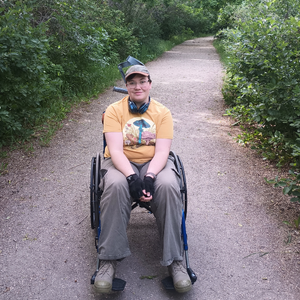
![]()
With a background as an ophthalmology tech, the world of ocular recovery and transplantation would be another adventure for Alex.
“I was scared,” Alex says, honestly. “I thought I wasn’t going to be able to do it. But the training started, and then the data entry made sense, and it just… clicked. And I realized – oh, I’m good here.”
What Does an Eligibility Specialist Do?
The eligibility specialist plays a critical role in the cornea donation process. Alex’s day begins around 8 a.m. and continues for 10 hours. They check if there’s any tissue to evaluate in the lab – using a slit lamp and specular microscope to assess layers of the cornea and count cells. They work closely with donor recovery coordinators and medical staff while reviewing charts, deeply reading through a donor’s medical history, often for hours, to determine if donated eye tissue is safe and suitable for transplant.
“There’s a lot of variability in how long a chart takes,” Alex illustrates. “Some I can finish in a couple of hours. Some take a whole day. But either way, we have to get it right.”
“There’s no room for error in what we do,” Alex clarifies. “We’re handling human tissue that’s going into human bodies. Every chart, every call, every detail matters.”
“If you’ve seen one case, you’ve seen one case,” Alex explains. “No two are the same.”
Sometimes You See Your People in the Charts
Alex is the oldest of four siblings. Sometimes, donor charts remind them of their younger brothers or sister. “When that happens, I send them a quick text. Just ‘I love you.’ That’s something this job has taught me – say it now. Don’t wait.”
Alex had cases where they had called a family of a child who passed away. They had to review charts that hit too close to home. “The first time I spoke to a mom about her child, he reminded me so much of my little brother. That was the hardest call I’ve ever made.”
Even though Alex doesn’t talk to families as much now, the stories will stay with them. Alex says the cases they’ve worked on...the details of each donor and their family. It sticks with them for a long time.
“You Can’t Take It Back”
Working so closely with death has changed how Alex lives. “This job made me realize how important it is to let people know you love them. You can’t take things back once they’re said. Or unsaid. Sometimes people get hurt—that’s inevitable—but making amends is important. And telling people how much they matter? That’s never wasted.”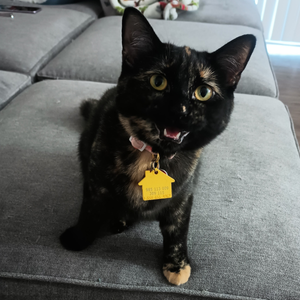
Even after the charts are closed, Alex takes the time to decompress. “I block out time after work just to unwind. I talk to my cat, Vecna. She’s named after the god of secrets and necromancy in [Dungeons & Dragons] (D&D),” Alex laughs. “She’s a tortie. Absolutely gorgeous. Eyes like midnight with gold irises.”
Adapting and Thriving with a Disability
And it’s not without its challenges. Alex lives with a chronic pain and dysautonomia condition requiring them to use a wheelchair and manage symptoms that would sideline most people. But through creativity, determination, and a supportive team, Alex has found ways to adapt to every part of their role – from microscope work to lab evaluations.
“I’m not wheelchair-bound,” Alex emphasizes. “The wheelchair gives me freedom. Without it, I’d be stuck in bed.”
The eye bank team has worked with them to troubleshoot everything—from getting close enough to the microscope, to adjusting for tissue handling, to creating workarounds that help Alex do their job seated. “I’ve got this little grabber tool next to my desk. It’s not fancy, but it works. We figured it out.”
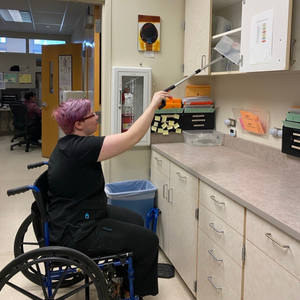
Nothing Happens Alone
When asked what keeps them going, Alex doesn’t hesitate: the team. “I couldn’t do my job without the donor recovery coordinators. And they couldn’t do theirs without us. The people in the annex can’t process tissue until we review it. We all depend on each other.”
That sense of collaboration is part of what makes the work meaningful. That, and the impact it has.
“We bring hope where hope has been lost. That’s our mission,” Alex says. “And I believe in that. I believe in what we do.”
A cornea transplant can be the difference between total blindness and the ability to see a loved one again.
“People Don’t Stop Dying Because It’s a Holiday”
The work is fast-paced – donor referrals come in within an hour of passing, and the technicians recover as soon as possible with the goal of 8 hours and the eligibility team needs to evaluate and verify that it is suitable for transplant within 72 hours. The team works around the clock, even on holidays, to ensure RMLEB is honoring the donation decisions of donors and their families and meeting its mission to restore sight.
That means working holidays, weekends, and nights. “Unfortunately, people don’t just stop dying because you want to take a lunch break. People don’t stop dying because it’s a weekend.”
Still, Alex finds meaning in it. “One beautiful thing about the eye bank is that we have the opportunity to turn that loss into something that helps someone else. It’s inevitable. People are going to die. But we can have something beautiful come out of that.”
Mentorship has also played a big role in Alex’s growth. “Holly’s been a really great mentor—she’s my shift partner, and I still go to her with questions. And I worked under Dr. Bethany Lucas in college, doing microscope research. That definitely helped get me here.”
Though Alex once dreamed of going to medical school, they now find their role as an eligibility specialist profoundly fulfilling. “I get to make a difference here. I get to help give someone the gift of sight.”
What They Want Others to Know
“I didn’t get into med school this year,” Alex shares. “And honestly, I think that’s okay. This job is fulfilling. It matters. I’m helping people. And I can see myself doing this for a long time.”
They encourage others—especially people with disabilities—not to count themselves out. “If you think you can do it, try. Find ways to work around your limitations. Advocate for yourself. And know you don’t have to do it the way everyone else does.”
Alex’s story reminds us: behind every chart is a life. Behind every transplant is a team. And behind it all are people who care deeply about doing the work right, honoring donors, and giving someone else a second chance to see. And Alex is proof that you don’t need to be loud to make a powerful impact. You just need to care enough to keep showing up.
Interested in a career in eye donation and transplantation? If you’re passionate about healthcare, science, and helping others, a career at the Rocky Mountain Lions Eye Bank might be a perfect fit. Learn more about our open roles and how you can make a difference.
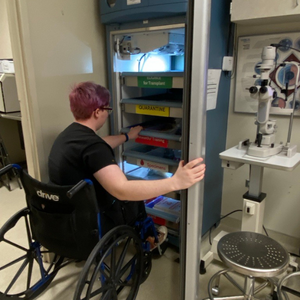
Go Back I sat down with Alex O’Connell (they/them), an eligibility specialist at RMLEB, to learn what it takes to help bring the gift of sight to someone who needs it most.
They Walked Into This Job Without Walking At All
Alex joined the eye bank in April 2024, fresh out of college and admittedly a bit nervous.
They were still figuring out how to live life with their newly diagnosed chronic illness, how to adapt to using a wheelchair, and how to navigate the weight of death- literally and emotionally - every single day.
And they showed up anyway.

“People think a wheelchair holds you back,” Alex says. “But it gave me freedom.”![]()
With a background as an ophthalmology tech, the world of ocular recovery and transplantation would be another adventure for Alex.
“I was scared,” Alex says, honestly. “I thought I wasn’t going to be able to do it. But the training started, and then the data entry made sense, and it just… clicked. And I realized – oh, I’m good here.”
What Does an Eligibility Specialist Do?
The eligibility specialist plays a critical role in the cornea donation process. Alex’s day begins around 8 a.m. and continues for 10 hours. They check if there’s any tissue to evaluate in the lab – using a slit lamp and specular microscope to assess layers of the cornea and count cells. They work closely with donor recovery coordinators and medical staff while reviewing charts, deeply reading through a donor’s medical history, often for hours, to determine if donated eye tissue is safe and suitable for transplant.
“There’s a lot of variability in how long a chart takes,” Alex illustrates. “Some I can finish in a couple of hours. Some take a whole day. But either way, we have to get it right.”
“There’s no room for error in what we do,” Alex clarifies. “We’re handling human tissue that’s going into human bodies. Every chart, every call, every detail matters.”
“If you’ve seen one case, you’ve seen one case,” Alex explains. “No two are the same.”
Sometimes You See Your People in the Charts
Alex is the oldest of four siblings. Sometimes, donor charts remind them of their younger brothers or sister. “When that happens, I send them a quick text. Just ‘I love you.’ That’s something this job has taught me – say it now. Don’t wait.”
Alex had cases where they had called a family of a child who passed away. They had to review charts that hit too close to home. “The first time I spoke to a mom about her child, he reminded me so much of my little brother. That was the hardest call I’ve ever made.”
Even though Alex doesn’t talk to families as much now, the stories will stay with them. Alex says the cases they’ve worked on...the details of each donor and their family. It sticks with them for a long time.
“You Can’t Take It Back”
Working so closely with death has changed how Alex lives. “This job made me realize how important it is to let people know you love them. You can’t take things back once they’re said. Or unsaid. Sometimes people get hurt—that’s inevitable—but making amends is important. And telling people how much they matter? That’s never wasted.”

Even after the charts are closed, Alex takes the time to decompress. “I block out time after work just to unwind. I talk to my cat, Vecna. She’s named after the god of secrets and necromancy in [Dungeons & Dragons] (D&D),” Alex laughs. “She’s a tortie. Absolutely gorgeous. Eyes like midnight with gold irises.”
Adapting and Thriving with a Disability
And it’s not without its challenges. Alex lives with a chronic pain and dysautonomia condition requiring them to use a wheelchair and manage symptoms that would sideline most people. But through creativity, determination, and a supportive team, Alex has found ways to adapt to every part of their role – from microscope work to lab evaluations.
“I’m not wheelchair-bound,” Alex emphasizes. “The wheelchair gives me freedom. Without it, I’d be stuck in bed.”
The eye bank team has worked with them to troubleshoot everything—from getting close enough to the microscope, to adjusting for tissue handling, to creating workarounds that help Alex do their job seated. “I’ve got this little grabber tool next to my desk. It’s not fancy, but it works. We figured it out.”

Nothing Happens Alone
When asked what keeps them going, Alex doesn’t hesitate: the team. “I couldn’t do my job without the donor recovery coordinators. And they couldn’t do theirs without us. The people in the annex can’t process tissue until we review it. We all depend on each other.”
That sense of collaboration is part of what makes the work meaningful. That, and the impact it has.
“We bring hope where hope has been lost. That’s our mission,” Alex says. “And I believe in that. I believe in what we do.”
A cornea transplant can be the difference between total blindness and the ability to see a loved one again.
“People Don’t Stop Dying Because It’s a Holiday”
The work is fast-paced – donor referrals come in within an hour of passing, and the technicians recover as soon as possible with the goal of 8 hours and the eligibility team needs to evaluate and verify that it is suitable for transplant within 72 hours. The team works around the clock, even on holidays, to ensure RMLEB is honoring the donation decisions of donors and their families and meeting its mission to restore sight.
That means working holidays, weekends, and nights. “Unfortunately, people don’t just stop dying because you want to take a lunch break. People don’t stop dying because it’s a weekend.”
Still, Alex finds meaning in it. “One beautiful thing about the eye bank is that we have the opportunity to turn that loss into something that helps someone else. It’s inevitable. People are going to die. But we can have something beautiful come out of that.”
Mentorship has also played a big role in Alex’s growth. “Holly’s been a really great mentor—she’s my shift partner, and I still go to her with questions. And I worked under Dr. Bethany Lucas in college, doing microscope research. That definitely helped get me here.”
Though Alex once dreamed of going to medical school, they now find their role as an eligibility specialist profoundly fulfilling. “I get to make a difference here. I get to help give someone the gift of sight.”
What They Want Others to Know
“I didn’t get into med school this year,” Alex shares. “And honestly, I think that’s okay. This job is fulfilling. It matters. I’m helping people. And I can see myself doing this for a long time.”
They encourage others—especially people with disabilities—not to count themselves out. “If you think you can do it, try. Find ways to work around your limitations. Advocate for yourself. And know you don’t have to do it the way everyone else does.”
Alex’s story reminds us: behind every chart is a life. Behind every transplant is a team. And behind it all are people who care deeply about doing the work right, honoring donors, and giving someone else a second chance to see. And Alex is proof that you don’t need to be loud to make a powerful impact. You just need to care enough to keep showing up.
Interested in a career in eye donation and transplantation? If you’re passionate about healthcare, science, and helping others, a career at the Rocky Mountain Lions Eye Bank might be a perfect fit. Learn more about our open roles and how you can make a difference.

